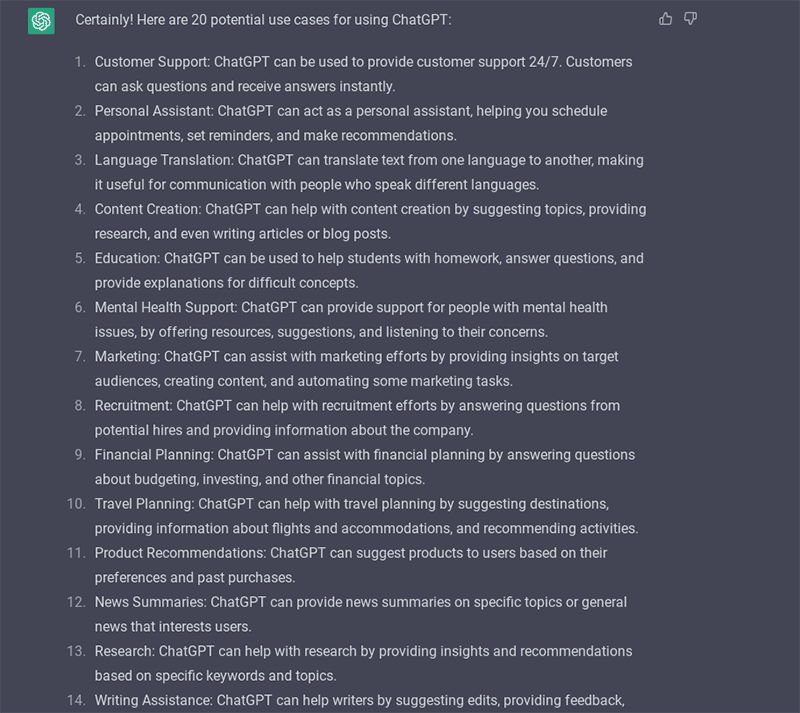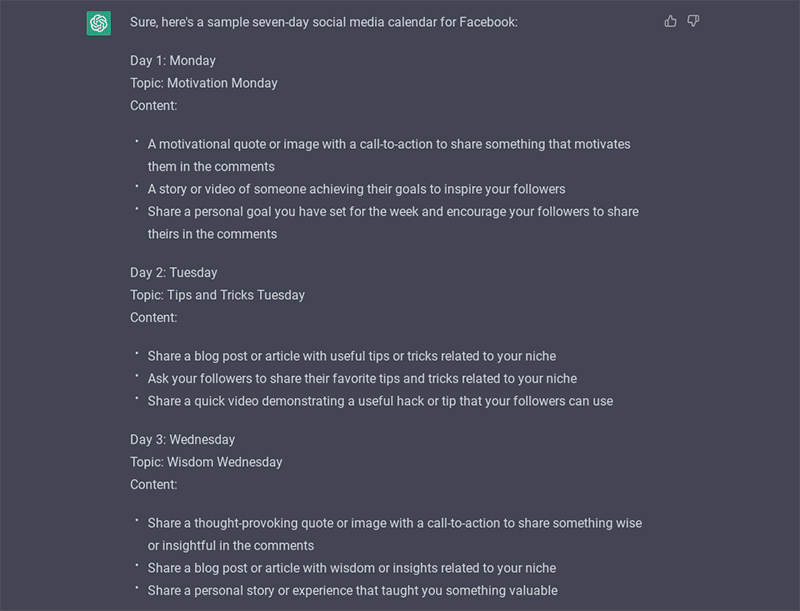With the release of groundbreaking AI tools like ChatGPT, many wonder if AI-generated content is the future of marketing and to what extent we can use it.
When it comes to SEO, there are a lot of questions today about machine-generated content. Is it an option? How would it impact the search results? Will it improve your SEO program?
While the answers will evolve over time, right now many people are simply trying to understand what ChatGPT is, and the benefits and drawbacks from an SEO content perspective.
This article will cover:
What is ChatGPT?
Simply put, ChatGPT is a chatbot – a natural language processing tool – that responds to queries.
ChatGPT has many, many use cases. I asked it to give me a list, and indeed it did:

But one use case being talked about in the SEO industry right is generating content quickly and easily.
I won’t go into too much detail on the ins and outs of how the technology works. You can get a background on that in an article here on Search Engine Land from Tom Demers on what ChatGPT is and why SEOs should care.
Or if you want to get into the weeds, see this article by Stephen Wolfram that explains how it comes up with written text.
Here, we’ll focus on how ChatGPT could change the content game for SEO and content creators.
What’s Google’s stance on AI content? Does it matter?
Aside from the fact that Google views ChatGPT as a threat to its existence, on the SEO front, Google has spoken out about automatically generated content several times over the years but their stance has evolved.
Previously, it seemed Google was taking the stance that all automatically generated content was bad. More recently, Google clarified that automatically generated content that’s intended to manipulate search rankings is really the culprit.
In January 2023, Google tweeted:
And, as outlined in its spam policies:
“Examples of spammy auto-generated content include:
• Text that makes no sense to the reader but contains search keywords
• Text translated by an automated tool without human review or curation before publishing
• Text generated through automated processes without regard for quality or user experience
• Text generated using automated synonymizing, paraphrasing, or obfuscation techniques
• Text generated from scraping feeds or search results
• Stitching or combining content from different web pages without adding sufficient value”
If you have been advocating for “quality content” as a marketer, you should apply those same principles here.
We all have our part in making the search results useful, and to help our SEO clients compete by positioning them as authorities on a topic.
What are some benefits of ChatGPT for content creation?
The biggest benefit of using ChatGPT is the speed at which you can get results.
If you were a small business or entrepreneur with limited resources to produce content quickly, I can see how ChatGPT would be an attractive option for creating content. (More on why this can be dangerous later.)
Nevertheless, ChatGPT can create output for nearly any content-related command you can think of.
Want sales materials written using pain points and solutions? Check.
Need a social media schedule? Check.
Want an answer on how to solve a link penalty written at a fifth-grade level so that it’s easy to understand? Check and check.
And the list goes on.

In theory, ChatGPT could revolutionize the way companies approach content marketing.
Marketers could use AI-generated content as a starting point for their campaigns – drastically cutting down on time spent and costs creating new material.
Get the daily newsletter search marketers rely on.
What are the drawbacks of ChatGPT for content creation?
While ChatGPT may seem like a very useful tool, there are some downsides to using this technology for content creation in your SEO program.
Some drawbacks include:
- It lacks the E-E-A-T factor.
- It can be factually inaccurate or low-quality.
- The barrier to entry for content creators is now lower.
- It has the potential to create mediocre search results.
Lacks E-E-A-T
E-E-A-T – experience, expertise, authoritativeness and trustworthiness – are the pillars of a quality piece of content, according to Google.
By its nature, it’s hard to imagine AI-generated content would meet E-E-A-T standards. And then you have “your money or your life” (YMYL) content, such as financial advice, medical advice and so on.
How dangerous could an AI-generated response potentially be when it comes to these topics?
Before you generate 1,000 words of AI-written content on a topic, ask the following questions:
- Would AI-generated content on this topic have the needed experience, expertise or authority to produce a high-quality answer for a search engine user?
- Would that same piece of content with the intervention of an expert or someone with direct experience on the topic be an OK solution instead?
Factually inaccurate or low-quality
ChatGPT is not connected to the web, and relies on the data it has been trained on to generate answers.
For any given query, that data may have come from articles, books and websites, for instance. However, ChatGPT’s worldview is limited beyond 2021 when its training stopped.
This can present many problems, not the least of which is being able to rely on content as truth – especially those topics that deserve freshness.
Since ChatGPT cannot guarantee 100% accuracy in understanding user requests, there is also a risk of content that misses the mark.
Finally, ChatGPT lacks human understanding. It might struggle with nuanced topics. ChatGPT may also create awkward phrasing and syntax errors.
Barrier to entry for content creation is lower
As if we already didn’t have a problem with low-quality content, AI-generated content now lowers the barrier to entry into the content creation game.
Now we will have a subset of content creators who are not in the business of critical thinking or creativity.
Content creators don’t have to know the topic or do the critical thinking necessary to research and create a thoughtful outline.
ChatGPT can create an outline for you, and you can then take that AI-generated outline and ask it to write a 2,000-word article. Within minutes, you have content.
In theory, we may see thousands of new content creators entering the game, doing content for cheaper and undercutting the competition. This could mean one of two things:
- The quality content creator as we know it today will get crushed.
- The value of a quality content creator who also knows how to leverage AI content will go up.
Mediocre search results
Imagine a world 10 years from now where every webpage has AI-generated content. What this could effectively do is lower the overall quality of the search results, for all the reasons I outlined previously.
Without the human and E-E-A-T element, the quality of an answer would be average at best – only as good as the AI algorithms would allow. And, if you consider the fact that some AI tools – like Jasper – are connected to the web, then the AI is reading its own generated content to come up with more ideas for content.
So the potential negative impact it has on the search results is real. And one of two things may happen:
- The value of a search result is going to drop.
- The value of a quality search result is going to go up.
For all these reasons, people should always be part of the process when creating complex content with AI tools. Without expert human review, low-quality content is guaranteed.
How will ChatGPT impact SEO content creators?
The value of a quality content creator who knows how to use an AI tool effectively will be more in demand.
I also believe that the value of a quality search result will be much higher in a world where AI-generated content becomes the norm.
What will likely happen is that content creators will use AI tools to do parts of their SEO work more effectively – generating ideas, developing outlines, improving the writing, creating rough drafts that require the heavy lifting of validating, researching and rewriting.
Essentially, these content creators will step into more of an editorial role. This role will not be for everyone.
But the question remains: Will it actually save time in the long run?
First, you must learn how to use AI tools like ChatGPT efficiently. The pre-work on the part of the content creator can make the output better. This can take time.
Then, if you choose to use an article written by ChatGPT, you have the laborious process of editing, which, if you have not put in the initial research into the topic (because you relied on AI to do the outline), then you have to familiarize yourself on the topic by doing the research. You accept the burden of quality assurance on the work of “others.”
So what may have taken you four hours to research, write and edit, now takes you four hours to configure the requests for the AI tool, fact check the AI data, do compliance, research, write and edit.
Maybe this process is made more efficient if you have editors that are subject matter experts.
I could see a scenario where a subject matter expert uses an AI tool to generate ideas and rough drafts, and then very quickly can validate the AI data, then finish it based on their personal expertise or experience.
In fact, I’ve played around with SEO topics in ChatGPT and found I could put together a cohesive “article” with about an hour’s time worth of editing. Then the real work starts.
You see, having something that is a written article and a finished article are different. I can get something average in one hour, which will probably not do much.
But if I want to express my opinion, add my “voice,” and educate to the level of my standard articles, I have much more work to do.
Another scenario is that some topics just don’t require a lot of critical thinking or research, and in these cases, AI-generated content may be a lot easier to work with.
If tools like ChatGPT can be used in a way that produces time savings for content creators, then the cost of quality content may go down in the future.
If you’re a content creator and you need to generate content for other channels aside from the organic search channel, the sky’s the limit with AI-generated content when you are not bound by the same types of guidelines and restrictions.
The only limitations will be a question of ethics and what is the right thing to do with AI-generated content. Some universities are currently pondering whether AI content is plagiarism, for example.
Tips for using ChatGPT for content creation
Here are some tips to consider if you want to use ChatGPT as a content creation assistant:
- Use ChatGPT for generating ideas, outlines and potentially chunks of information you might be able to repurpose for your content. For more specific examples of how to use ChatGPT for content creation, see an article from Tom Demers on how ChatGPT can help you create content for SEO.
- Continue to preserve a high level of human intervention and the editorial processes you have in place when creating high-quality content.
- Provide ChatGPT with accurate information and contextual understanding upfront. The output’s quality will depend on how well you can do this step.
- When editing the content, use a tool in conjunction, such as GPT-2 Output Detector Demo, to see if the text looks like it was written by a human or a bot.
I am optimistic about ChatGPT’s potential, but for all the reasons I outlined in this article, I advise you to use caution when using ChatGPT for content generation.
That said, if you use it, make sure there is always expert human review before publishing AI-generated content to the web to ensure quality.
Ethically, we all have a part in ensuring the search results produce the best answers for users, and that we are providing the very best service for our SEO clients.
Opinions expressed in this article are those of the guest author and not necessarily Search Engine Land. Staff authors are listed here.
Related stories
New on Search Engine Land
https://searchengineland.com/chatgpt-seo-content-where-do-we-go-from-here-393374


